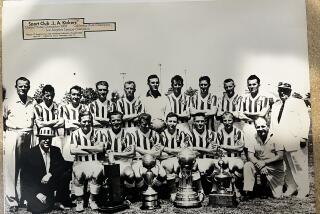WORLD CUP / USA 1994 : Who’s O.J.? Ask Foreign Media in U.S. for Soccer : World Cup: Reporters can’t understand why Americans are more interested in Simpson than the international games.
- Share via
The soccer-mad media people from around the world are a bit confused.
“What does O.J. stand for?” asked a radio announcer stationed at the International Broadcast Center in Dallas, a war-room setting where thousands of commentators are giving up-to-the-minute reports on World Cup soccer minutiae.
When told, he replied, “Oh, never mind. It’s not important.”
Not when the world’s preeminent sporting event is on hand, including Saturday evening’s Colombia-Romania match at the Rose Bowl.
Indeed, the story of O.J. Simpson that has captivated Americans for the past week is hardly being recognized by the 10,000 broadcasters and print journalists who have come to the United States to cover World Cup ’94.
Not only are most international journalists ignoring the Simpson saga, but they are grasping to understand what it is all about, and thus what America is all about.
“Two hours of a car driving on the freeway and you call that riveting?” asked Mark Gleeson, a South African reporting for Reuters. “I’d hate to see these Americans at a cricket match.”
Now that is something the sporting press won’t have to worry about.
But when it comes to soccer, not even the downfall of a bona fide American sports hero can diminish the frenzy.
“They would not think of dropping one second of coverage of soccer to talk about an American sports star in trouble,” said Peter Gee of the Australian Broadcasting Corp.
Or more succinctly: “We didn’t mention it because he’s not a big hero in Hong Kong,” said Wendy Ha Hon, a television commentator.
With broadcast powerhouses ABC, CBS, NBC, CNN, ESPN and WGN Chicago providing live coverage of Friday night’s dramatic chase along Southland freeways, the rest of the world remained true to its soccer passion.
It was not so much a news blackout as it was indifference.
Said a member of the Arab States Broadcasting Union: “The Simpson story is purely of American interest. We absolutely did not report it. I think it is unfortunate to unfold on the first day of the World Cup after all the preparation to bring soccer to America.”
There was more than a little resentment that a crime story would overshadow the World Cup, particularly during its American debut.
“If this Mr. Simpson was (President) Clinton, then I could understand,” said Elihu Ben-Onn of Israel Radio.
If nothing else, the full-blown live television coverage reinforced foreign perceptions of American character. To those who watched, it was an ethereal scene resembling a Hollywood movie.
Ben-Onn found symbolism in the reportage.
“It is another signal to show how Americans are different,” the Israeli sports commentator said. “They are busy with local stories on murder when the biggest show in the world comes to their country. Maybe they will start driving on the left-hand side of the road. Then they would be complete in their uniqueness.”
Still, Ben-Onn was eager for details of the Simpson case for his special report Saturday night in Jerusalem. But why, he wondered, were Americans infatuated with the former USC football star, whose professional career ended in 1979?
“Who is he?” Ben-Onn asked.
When told Simpson’s celebrity was equal to that of Earvin (Magic) Johnson, he nodded slowly, if unsurely.
At the Rose Bowl, Juan Carlos Gonzalez of Guadalajara Notisistema of Mexico was equally nonplussed.
“It was all O.J. Simpson,” he said of the coverage, throwing up his hands. “It was exaggerated. I’m not sure why the Americans like O.J. Simpson so much.”
Ferdynand S. Grzeszcak of TVP, Polish television, was wondering the same thing while sitting alone in his cubicle at the media center adjacent to the Cotton Bowl in Dallas. It never occurred to him to mention the Simpson case, focusing only on Saturday’s matches in Detroit, New York and Pasadena, and other World Cup news.
“It’s life, but I don’t like it,” he said of the murders of Simpson’s ex-wife, Nicole Brown Simpson, and her friend, Ronald Lyle Goldman.
The French, not surprisingly, were equally resistant. Broadcasters at Radio SRF laughed when asked if they reported the incident. France, after all, did not qualify for the 24-team World Cup so perhaps. . . .
“I’m interested in sports but I’ve never heard of this guy,” a staff member said.
Aghast, she said of the American media: “They’re not even talking about the World Cup. Just about this.”
And that was something most foreign journalists failed to comprehend.
Almond reported from Dallas, Nazario from Pasadena. Times staff writer John Hurst also contributed to this story from the Rose Bowl.
More to Read
Go beyond the scoreboard
Get the latest on L.A.'s teams in the daily Sports Report newsletter.
You may occasionally receive promotional content from the Los Angeles Times.







